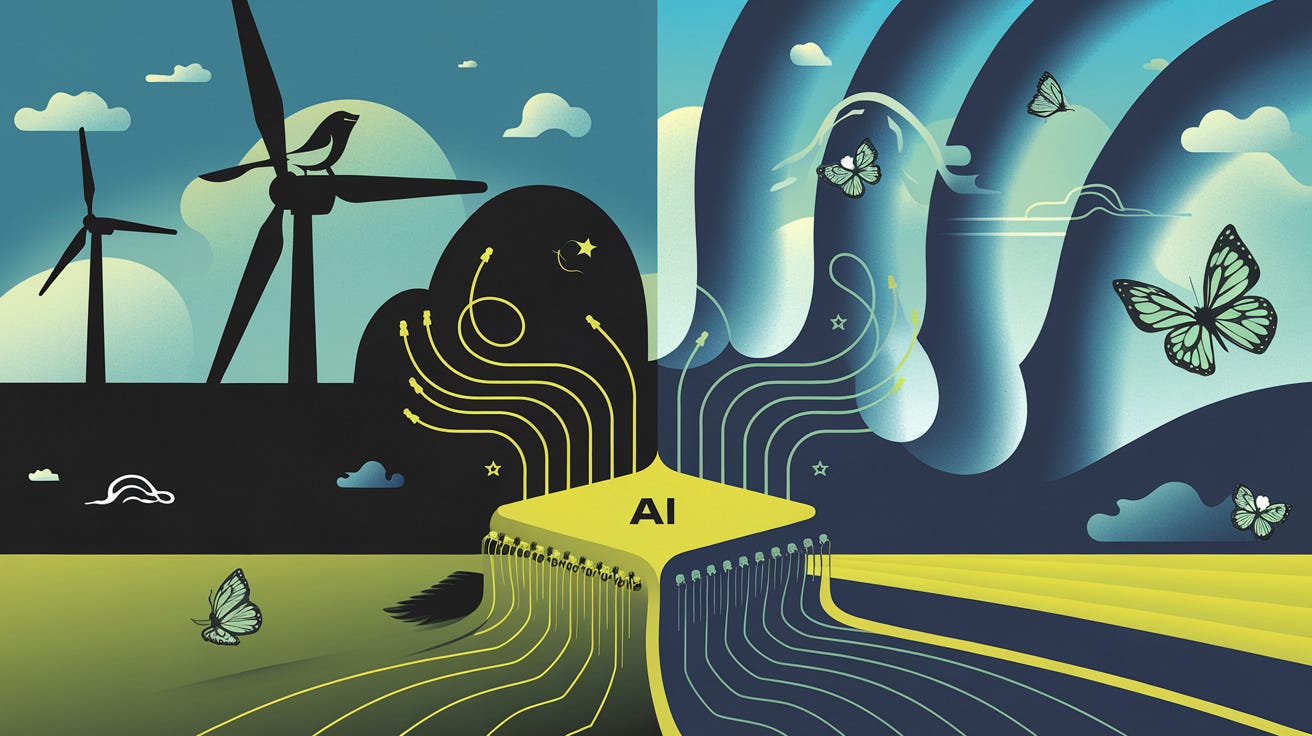Quick note before we start: As a heads up – this newsletter contains references to startups and different organizations. I'm not endorsing any companies or products mentioned here (and if I do, I promise to be transparent about it). This newsletter is just for info and fun. Make sure to do your own digging (and tell me if you find gold💰)!
oh and… please subscribe!
Hey there Climate Globetrotters!👋
Welcome back. These past two weeks have been busy, and I’m here to help you cut through the news and see the Reconfiguration for what it is: here.
Hope you enjoy this edition of News Reconfigured. If you don’t, feel free to pretend you did.
On Today’s Agenda:
🧭 Frontier Watch: Yeah, I have a take on DeepSeek
🎪 Globetrotting: Drill Baby Drill, in the Arctic
🌊 Ripple Reports: Denmark goes hard on plant-based food
💻 Tech, Reconfigured: Climate-tech startup FireDome reconfigures fire weather
🧭 Frontier Watch
Major shifts that caught our attention in the past two weeks.
Another guy with an opinion on DeepSeek
*** don’t talk about DeepSeek *** 😤
*** don’t talk about DeepSeek *** 😤
*** don’t talk about DeepSeek *** 😤
Ghaaaa! Sorry, I can’t. I have an opinion and you must know it.
DeepSeek's R1 model has taken the AI world by storm, rivaling OpenAI's GPT-4 at a fraction of the cost and resources. This breakthrough sent shockwaves through the market, briefly wiping $600B off NVIDIA's market cap, and sending folks into a frenzy.
Allow me to sidestep the geopolitics and technical issues, to hone in on one of the lesser discussed angles: Energy🔋🪫
The dominant narrative on AI and energy was pretty simple: AI is a voracious technology that knows no bounds in how much energy it needs, leading to staggering predictions on the required infrastructure (data centers, anyone?) and the energy to power it. This was not just punditry: tech giants made massive investments into renewable energy as they sought to power their latest models, while trying to meet their net-zero goals (like Google, Amazon and Microsoft).
Then DeepSeek happened, throwing wrenches in the ever-growth narrative. “Time” said it best in my opinion:
For the last year, analysts have warned that the data centers needed for AI would drive up power demand and, by extension, emissions as utilities build out natural gas infrastructure to help meet demand.
The DeepSeek announcement suggests that those assumptions may be wildly off. If the company’s claims are to be believed, AI may ultimately use less power and generate fewer emissions than anticipated.
So… should Microsoft shelve its investment in the Three-Mile Island Nuclear Reactor? I wouldn’t be too quick on the draw🤠
There’s still so much we don’t know. I’m not at all sure this efficiency leap means less emissions overall. You know people - improvement is just an excuse to continue to use even more of AI in the longer term (Jevons, i’m looking at you👁️). At the end of the day, it really doesn't matter if model training becomes less energy intensive if we end up using more of AI, as inference is equally important to training when it comes to emissions.
It’s not just a popularity contest that we’re talking about. It’s reasoning. DeepSeek uses a chain-of-thought type of model, which means that the model breaks down tasks into smaller parts and works through them before giving the final answer. It turns out that reasoning models use more energy than “regular” models, a study found. The growing popularity of reasoning models, coupled with DeepSeek’s new methods, mean that while training costs may decline, inference costs will actually rise.
So no, I don’t think DeepSeek signals the end of power-hungry AI. Maybe, it’s the opposite. The reconfiguration of Energy is not a linear process, but I still think that we are likely to see tech giants continue to make investments in renewable energy; we are likely to see investors continue to pour money over new renewable capacity with the expectation that tech giants remain Off-Take buyers; and, that news outlets will continue to lament renewable energy every time some new breakthrough happens.
🎪 Globetrotting
Last week, we took a deeper dive into the natural resources that are frozen within the Arctic tundra and how that intersects with Trump’s desire to invade buy Greenland.
Our trip to Greenland muses over the irony of climate changed-induced growing access to rare earth minerals crucial for renewable energy, the geopolitics of the region, and about the reconfiguration in its full might.
Read the full deep-dive here:
🌊 Ripple Reports
The Reconfiguration is not always about making giant waves, but sometimes about making smaller ripples. Let’s take a look at some of the more subtle signals of the Reconfiguration:
Denmark Goes Hard on Plant-Based Food
What Gives: Reported by the Guardian, plant-based food sales now consists of 53% of the Danish food market, with meat consumption decreasing by 30% since 2020.
Plant-based Meat Reconfigured: I thought it couldn’t be done, but hats off to Denmark🎩 for succeeding in large-scale adoption of plant-based food. The Danish Kingdom managed to do so through significant public investments, public messaging, and a comprehensive plan that is being implemented. The Reconfiguration is not all bad news. Sometimes we see ripple effects that are quite refreshing, driving systems towards sustainability and decarbonization. This is one of these effects, where climate change and impact of meat is driving an entire country to change its diet, quite literally.
👩💻Tech, Reconfigured
Innovators, inventors, and explorers building tools for our changing world
FireDome Reconfigures Firefighting
What Gives: TechCrunch reported on a wave of new startups that try to combat fire (akin to the LA fires) by leveraging new technologies, including AI (what else…). One of these companies, FireDome, takes a different approach to fire fighting; instead of combating fires, they defend from them.
Firefighting Reconfigured🧑🚒: FireDome uses drones, AI, and IoT sensors to detect and predict wildfires, and to automatically extinguish spot fires. Their defense-inspired approach is somewhat of an inversion of conventional wisdoms with respect to firefighting, as highlighted in a recent post at MCJ’s newsletter. As climate change makes fire hazard more likely, insurance becomes less available, up to the point of… 🥁uninsurability. Part of the problem is managing risk, and another part is… well, more fires, really. FireDome is an example of how technology can help adjust to this reconfiguration, and help insurance companies avoid bailing out on us. FireDome, and other companies fighting the good fight, show not only the link between climate disasters and startups (“oh hey this is important now, let’s fund them”), but also how reconfigured industries can use technology to adjust and manage seismic shifts.
Full disclosure: I know the founding team personally. They are good people. Help’em out here: http://www.fire-dome.com
(helping your friends is a privilege of having your own newsletter, deal with it)
That's a Wrap, Climate Globetrotters! 🌍✈️
We've reached the end of our second expedition into the Reconfiguration. Hope you enjoyed the ride! Here's what's on the horizon:
🧊 Next week: Part 4 of our Arctic adventure will bring us to China and Russia’s shenanigans up North. Stay tuned!
📅 In two weeks: Your next "News, Reconfigured" dispatch lands in your inbox.
Before You Go...
📸 We're on Instagram! Follow @AWorldReconfigured on Instagram for bite-sized climate insights and behind-the-scenes peeks.
💌 Spread the word: If you enjoyed this newsletter, why not share it with a friend? Every new reader helps us grow our climate-curious community.
🗣️ Your turn: What did you think of our maiden voyage? Hit reply or use the poll below to let me know. Your feedback shapes our future expeditions!
That’s it! See you next time on the frontlines! 👋🌊







